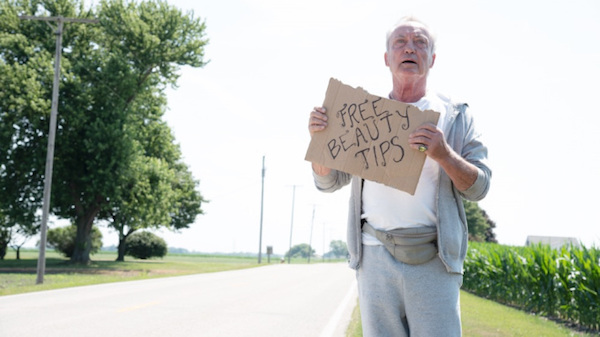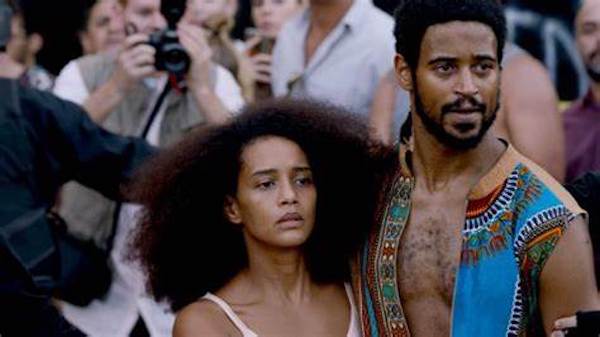Last year’s SXSW festival was underway when it fell victim to the pandemic lockdown. This year’s edition took place online, a necessary but regrettable compromise that doesn’t really satisfy anyone. On the plus side, titles previously out of bounds to viewers not in Austin were suddenly available across country (and in some cases around the world). That also means a degraded viewing experience, lack of access to publicity apparatus, some technical foul-ups, and no word-of-mouth praise or warnings.

A hierarchy emerged even within the newly egalitarian festival structure. Some titles could be screened beforehand, others had more restrictive viewing schedules. To say nothing of embargoes that shifted depending on early screening link reactions.
This year’s edition included 75 feature films, reduced from over 100 in previous festivals. However, 75 is still too many to screen, to say nothing of the shorts, panels, Q&As, and other events. When he spoke before a festival screening of The Irishman, Martin Scorsese gave his thoughts on “New Cinema,” breaking it down into three categories: theatricals (largely superhero franchises), movies for streaming (what were formerly midlevel theatricals — one-offs, romances, biopics, etc.), and festival movies. Apart from the big guys, like Toronto and Cannes, festivals schedule calling card films, offbeat niche experiments, deliberately provocative cries for attention.
The pandemic squished those three categories into one endless stream, although vaccines may help resurrect theatrical (and repertory) screenings. On the one hand the pandemic opened festivals up to a much wider audience. But on the other hand it’s been a disaster for smaller films, the kind that would receive an enthusiastic response from insider audiences.
Like Swan Song, a resolutely niche vehicle for the wonderful Udo Kier. A fixture in indie cinema since his work with Warhol and Fassbinder in the 1970s, Kier has earned the right to do anything he wants, including starring in the exceptional Bacarau and swanning his way through Swan Song, a wan tale of elderly rebellion. (Magnolia will be distributing.)
Kier’s a former hairdresser in a nursing home, sneaking cigarettes and stealing from the dining room, tiny rebellions that endear him to the largely Black staff. Breaking loose for a last fling, he learns that his former salon has shifted to a Black clientele. No bother: he teases them politely before making his way to a funeral parlor to dress the hair of a deceased friend.
Writer and director Todd Stephens leans heavily on camp, and on Kier’s willingness to overplay his role. Swan Song is a variation on The Straight Story, The Late Show, and any number of other showcases for aging stars — just as romanticized, ultimately just as false. What’s different here is a sensibility where disco tunes are meant to carry narrative weight.
Swan Song is basically short vignettes in which Kier wins over skeptics through blunt-force charm. Not even the ordinarily superb Jennifer Coolidge can overcome a heartfelt but skin-deep movie that coasts on Kier’s ageless appeal. Stephens (not the Republican Congressman from Pennsylvania) previously wrote and directed Another Gay Movie and Another Gay Sequel: Gays Gone Wild!.
Executive Order is after bigger game, and in fact Lázaro Ramos’s “it can’t happen here” drama is way overqualified as a festival item. Set in a future Brazil where Blacks are classified by melatonin levels, it asks what would happen if a racist white government essentially outlawed Blacks, rounding them up to ship back to Africa.

Given the current state of Brazilian politics, it takes courage to make a movie like this. It’s too bad Ramos follows genre conventions so rigidly. Executive Order plays out like an AIP message drama from the 1960s, maybe Panic in Year Zero! or MGM’s earlier The World, the Flesh and the Devil. Narrative twists are telegraphed (the villains almost wink at the viewers), the heroes are too good to be true, and the message itself too obvious to carry much weight. The frightening changes in Brazilian society over recent months give Executive Order its real power.
Music is at the heart of SXSW, as the three showcases in the festival proved. The opening film, Demi Lovato: Dancing with the Devil gave the former Disney star the opportunity to explain herself on her own terms. Tom Petty, Somewhere You Feel Free explored the making of his solo project Wildflowers. And Under the Volcano recounted George Martin’s AIR Studios on the island of Montserrat.
Willie Nelson even popped up in a pre-taped interview with Andy Langer. And Without Getting Killed or Caught profiled Guy Clark, devoting time to his wife Susanna Clark and best friend Townes van Zandt. I’ll discuss these and other films in future posts.


